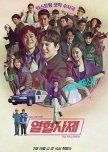
Divine Wrath strikes with unabashed humor, yet healing wounded souls of black, gray + shorn sheep
"The Fiery Priest" is all about Korean humor. You might have to get used to it. At least I did. The first time I approached the series I probably wasn't ready and possibly not in the right mood for such cheerful, tongue-in-cheek fun à la Korean style. I gave up quite early (probably after the first episode). On the second try tough, everything just fell into place. And by now I can say from experience: "The Fiery Priest" is ideal for repeat offenders. I had even more fun then... (And that probably wasn´t the last time I watched...)Nonetheless. Korean humor is special, especially when it comes to the fascination of the intestines - often enough they are gladly celebrated in a wide variety. Here as well. Utter confusion and frenzy are also a must. Instead of tried and tested bar fights and brawls of the western type however, the focus here is rather on choreographed martial arts.
Humor reigns supreme in "The Fiery Priest". Humor determines the pace, the timing, the nuances and the ambience. Slapstick, situation comedy, dialogue jokes, parody, irony - hardly anything is left out. "The Fiery Priest" doesn't take itself too seriously. The central storyline says it all: in the robes of a priest a former NIS agent ensures order and justice. Even the Pope has his brief appearance here. But also the 'sects' with self-appointed saviors flourishing in the country.
And yet, the "The Fiery Priest" has some serious tones to offer, too - besides and in the middle of all the slapstick. The plot background is once again fueled by South Korean backroom liaisons between executive, judiciary, politics and crime. With regard to the personality development of the individual characters, touching emotional moments also come along here and there - comparatively modestly, but nevertheless with impact.
Finally, "The Fiery Priest" also plays out another strength of KDrama: Here you can experience a lot of cheerfully and yet subtly touchingly executed bromance and womance. (However, there's no romance. But nobody has to miss it.) Bromance and womance as well as the variety of embedded side plots inspirit dramaturgical facets, that may touch the heart, having quite something to offer between soft touch and punch. It is simply a pleasure to watch the various dynamic personality developments. (Outstanding actors all along, by the way!)
"The Fiery Priest" spectacularly succeeds in balancing a tightrope act - good-humoredly and mischievously dancing above an unspeakable swamp of injustice, bribery, abuse of power and human greed.
Divine Wrath strikes with unabashed humor, thus along the way healing the wounded souls of the black, gray, and shorn sheep.
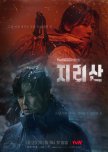
"Jirisan" radiates within the slowed down, yet powerful dynamic of the mountain world
"Jirisan" pays tribute to South Korea's first and largest national park and its rangers, who ensure security and order here. The KDrama weaves an exciting story that also takes into account the special aura of the mountains, adding a good portion of mysticism. Actually Jiri Mountain is quite legendary and downright sacred for Korea. It's worth watching the KDrama for that alone.Other quality guarantees are given by the handpicked cast and high-end production.
A joy for some, a curse for others: "Jirisan" radiates within the slowed down, yet powerful dynamic of the mountain world. The story itself is a bit reminiscent of a mountain hiking tour: it's not a stroll. You need the right footwear. Sometimes you might think you've lost your way. The story is told in several timelines. Yet it chooses its own rhythm with a sure step, that leads to the final destination. On the way it is continuously enriched with worthwhile vistas along the entire route... Fast pace and airy love story are not part of the baggage. But exciting entanglement over time, unconditional trust as a topic in the team of rangers, as well as love in its essential form and various expressions (... e.g. for the mountain).
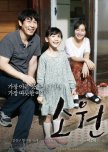
Even though what happened is unfathomable, despite all the tragedy, the deeper focus is on hope
A true story. Not the only one of this kind, unfortunately. This one took place in South Korea in 2008 and was filmed in the KMovie "Hope" in 2013. (In the original: "Wish" - the meaning of "Sowon", the name of the eight-year-old protagonist.)This film production, which was shown in neighboring Asian cinemas, too, achieved great success largely through word of mouth. The story is shocking and touching, while the film adaptation laid its focus less on exploiting the crime itself, than on sensitively dealing with how it affected the little girl, her family, friends of family and classmates. It's less about the incredibly unscrupulous, brutal act than about the family's struggle to continue to come to terms with the unfathomable and the consequences on a wide variety of levels - psychological, physical, social, financial, legal, media-related and everyday practical.
“Hope” received quite some film awards. Despite all the heartbreaking tragedy, the KMovie deliberately intents to touch people in a positive sense. The KMovie wants to open up an, nevertheless, optimistic perspective towards a life 'after'. This, obviously, is tough and challenging. Surely it takes time and even more patience. Heart-rending in this context, for example, is the wonderfully authentic portrayal of the massively threatened father-daughter relationship. Unexpectedly, though, some light comes into the darkness. Sol Kyung-gu - in the role of a desperate father, whose daughter is in danger of slipping away from him due to her terrible experiences – apparently did not take off his distinctive costume throughout the entire shoot in order to maintain high contact with the emotions and their intensity the whole time. And Lee Re, in her debut on the big screen as an eight-year-old daughter, also touches the heart, as does Uhm Ji-won, who initially apparently didn't have the courage to take on her role of the mother. She is also deeply touching with her convincing acting that gets right under your skin.
Even though, what happened is and remains unfathomable, despite all the tragedy, the KMovie explicitly focuses on hope. This way, throughout those 122 stirring minutes it is not all grim all the time.
------------------------------------------------------------------------------
SIDE NOTE: --- The Cho Doo-soon case ---
The story refers to a rape case from 2008, when a drunken 57-year-old man brutally raped an eight-year-old girl in a public toilet in Ansan. Being as brutal as he was, the girl suffered permanent damage. However, the man (who before had already been convicted of rape, among other things) got away with only 12 years in prison. He consequently kept up his mantra, that being so drunk that day he couldn´t remember anything. This had already helped him in previous cases. Here too, he was given mitigating circumstances due to his age, the influence of alcohol and his mental state.
The rape in Asan was extremely gruesome. (The details were not in so much details explicit in the KMovie and I also do not want to waste any letter for them here, either.) Suffering from her internal and external injuries, the girl was hospitalized for eight months. She took an artificial anus back home. Medical treatment was followed by psychiatric treatment. A year later she was at least stabilized enough to go back to school. But even several years later in 2020, she apparently can handle harmless cartoons on TV only, avoids any news and tough topics, i.e. she is still extremely fragile and unstable when it comes to the issues involving any violence at all.
The investigation and trial in this case from 2008 didn´t get covered in glory. On the contrary. The public outcry was great and extended, among other things, to a petition to the Blue House for retrial. The case also led to a number of legislative proposals being submitted by the Democrats, which would, for example, suggest to imprison repeat offenders of sexual offenses against minors in special facilities for life, or e.g. concern the legal handling of sexual offenses committed under the influence of alcohol. But in the end they didn't go through, nor did various petitions.
Instead, the electronic ankle bracelet was the method of choice when Cho Doo-soon was released in 2020. The cost of continuous monitoring of Cho Do-soon's electronic ankle bracelet during the first 4 months after release only, was estimated by the Ministry of Justice at over 200 million won (over 140,000 euros). In addition, apparently 71 security cameras were set up specifically to protect Ansan's residents from Cho, who still has his wife and his home there…
By the way, the infamous Cho Doo-soon case was also topic in the K-dramas "Taxi Driver 2", "Voice 4" and "Vigilante".
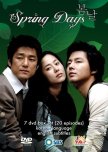
There are times, I think, when nothing beats a KDrama from the early 2000s
"Spring Day" is a love story told in a triangle. So drama in drama feels right at home here. And "Spring Day" has a lot more to offer in the proven makjang-mix to really heat up the story. If the merry-go-round isn't going straight forward, than simply because it's going backwards.Three is one too many. Being well aware of the consequences and where the story must lead towards, it is nevertheless the path that paves the series pleasure of cathartic ups and downs. You can get really upset about this and that. The rhythms of the soundtrack whip your emotions through the most varied of situations. The assorted mix of (by now long) proven actors give the protagonists their three dimensional profile. None of those characters is really grippy, smooth or edgeless, though. Whether brotherly relationship, romance or parental relationship, it´s all full of sometimes touching, sometimes pathetic ambivalences – sometimes hurting, sometimes soothing and hurting at the same time. In short, the KDrama presents quite some space for compassion and catharsis.
There are times, I think, when nothing beats a KDrama from the early 2000s. I couldn't have timed my ´Spring Day´ better (in Spring 2023). After a flood of stories about contemporary scheming, autocratic backroom politics, bullying among students and misogyny, "Spring Day" feels like an island in many ways. The world is not safe there, on the contrary. Makjang rocks the turbulence upwards. Nevertheless, there are 'only' personal destinies and family tragedies here that do not have the social impact of some current series topics. We get thrown around in an ambivalent emotional swell between 'soothing' and 'hurting'. In the end the story is told to the end. The ending may or may not please, but it has its ending. (A lot of recent KDrama with current underlying social issues tend to deep down leave a thorn after the end of the story, as the social swamp that fueled the story remains a given reality and lingers on…)
------------------------------------------------------------------------
By the way:
With "Spring Day" in 2005, Go Hyun-jung marks her comeback after a War-of-Roses divorce with a Jaebeol of the Samsung Dynasty. So in 2003 she actually had just finished her own Makjang drama personally. Eventually, she was able to free herself from the obviously tormenting clutches of her husband and his dominant, oppressive family, who (so it is said) permanently devalued her because of her humble origins, simply making use of her beauty for bearing pretty children. Yet the price for liberation was high. Above all, she had to leave her children behind and give up visitation and custody rights. Although she was able to re-establish her life somehow against all (by her husband´s family deliberately implemented) odds , she (so it is said) still is not allowed to see her children to this day.
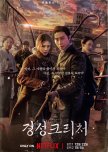
In its monstrosity hardly dealt with war crime pulled off the dusty shelf in vividly stylized mode
The Netflix production “Gyeongseong Creature” turns out to be quite an idiosyncratic mix. Studio Dragon had the opportunity to experiment and make full use of an illustrious cast. Despite some clichés, "Gyeongseong Creature" is not a banal K-drama that you quickly forget.Basically it's another hero´s quest of some hero against his will, discovering unexpected sides of himself. It´s another ´mission impossible´ right into the lion's den - in this case: the military hospital of the Japanese colonial army base in the middle of the capital of the Chōsen colony in 1945. It is not the fair maiden who is to be saved, but the kidnapped, impregnated courtesan of the chief of the Japanese police. It turns out that a 'dragon' - in this case an artificially created monster - also has to be overcome along the way. The hero is flanked by a motley crew of long-standing and spontaneous companions...
Now this old wine comes in a freshly spiced-up Korean-style bottle. The personal touch of "Gyeongseong Creature" is precisely that Gyeongseong in those final months of the Pacific War, when Seoul bore that name. The historical setting as well as the historically and socially significant issues of Japanese colonial rule give the plot its selectivity and a quite serious foundation, so that "Gyeongseong Creature" does not simply offer interchangeable run-of-the-mill entertainment. Here, a painful chapter of South Korean suffering is intertwined with personal fates in the form of loosely interspersed critical events during colonial rule that is officially (by Japan) to this day preferable neglected, not to mention rehabilitated. With this Netflix production it has been nonchalantly thrown onto the World Channel to be proclaimed and acknowledged in HD.
This involves in general: the arbitrary racist violence and oppression against the Koreans as well as the systematic torture and execution of suspected resistance fighters in Sodaemun Prison; the forced military conscription and bullying of Korean soldiers within Japanese units; the forced recruitment or abduction of comfort women for (mass rape for the pleasure of) frontline soldiers... And specifically in the case of this story: the monstrous machinations of Unit 731 as part of the Imperial Japanese Army, which went down in history for its inhumane experiments on human subjects. Although these experiments actually took place mainly in Harbin in Manchuria (see side note below), they were for this KDrama also imported to Gyeongseong for a compact narrative stringency.
Against this background, "Gyeongseong Creature" tells its fictional story with artistic license. In some scenes you may get the impression that you have lost your way in a parody. Despite of such incomprehensible human menace and distress, the story presents itself at times completely unimpressed by any seriousness. There is room for humor and coolness, (which sometimes made me think of a parody of 'James Bond' or alike production). There is this reluctant hero who sometimes appears naive, sometimes quite cheeky and self-confident. He´s someone who has learned to achieve his goals, but who prefers to stay out of any trouble, wearing a stylish suit. And then, out of nowhere, he can withstand torture and injuries as if it were nothing at all. You can't really take this seriously. And yet...
In contrast, there is plenty of objective seriousness and expertise from the two foreign travelers on their detective mission. Pleasant extra: a clever, self-confident FL who is quick-witted in every respect.
In contrast, there is also the extremely dark world of medical experiments (and their artistic documentation) – underground on the military site.
In contrast, there are also the monsters, the army and the imprisoned test subjects.
And in the middle of the perfidious chase, the great feelings of humanity shine through: familial bonds and solidarity as well as wounded pride and jealousy act as driving forces, flanked by patriotic resistance and questionable scientific ambition. It's hardly surprising that Cupid also shoots his arrow in passing.
Not only do the individual characters at times feel like caricatures of themselves, Gyeongseong's production, choreographed in light and colors, also seems to come from an unreal fairytale world. While the pawnshop shimmers in all colors, the Japanese research laboratory is stylized as a dark dungeon beneath the military prison. And then there is the Moonlight Bar on the one hand and the police chief's property on the other - each of them control centers with a certain (political) impact. All of this is impressively aestheticized again and again in hand-picked scenes and settings. Sometimes you can feel like you're in the theater and then again like you're in the high-resolution digital world of a computer game.
So is the KDrama worth watching? On the one hand, "Gyeongseong Creature" takes itself very seriously with regard to its historical contemporary themes, but on the other hand, in the clichéd exaggeration of the individual characters, it apparently doesn't. This KDrama mix chosen for "Gyeongseong Creature" is, in my opinion, quite daring. However, I mean this in a benevolently positive way, in the sense of 'feeling free to experiment'. You might have to get used to it - but easily so. The (let´s say) rather 'banal' entertainment element - the Mission Impossible in view of the numerically superior Japanese military and the monster creation - is effectively intertwined with painful historical reality in a strikingly piquant and catchy manner. During the action-packed and visually stunning ride through the episodes, the KDrama subtly but consequently throws its barbs of memory at the audience.
The KDrama surely is offering cinematically solid entertainment with a star cast, but at the same time, based on the different personal backgrounds of the main and supporting characters, it demands acknowledgement of how the Japanese dealt with Koreans at that time. By stylizing the manifestation of Unit 731's monstrous experiments and research in the form of a concrete monster with superpowers, "Gyeongseong Creature" symbolically brings the unsatisfactorily dealt with war crime off the dusty history shelves in an unmistakable monstrosity.
...
Well, a second season has already been announced.
This will obviously be set in contemporary Seoul, though. We´ll see...
---------------------------------------------------------
SIDE NOTE: --- Unit 731 of the Kwantung Army of the Imperial Japanese Army ---
From 1932 onwards, Unit 731 of the Kwantung Army of the Imperial Japanese Army under the leadership of Ishii Shirō was stationed in Harbin, the largest city of the puppet state of Manchukuo in northern Manchuria. Around 3,000 mostly bacteriologists carried out experiments on living people there. The test subjects imprisoned and tortured there were predominantly Korean and Chinese civilians as well as Soviet prisoners of war. Later, including American prisoners of war, too.
Unit 731 of the Kwantung Army of the Imperial Japanese Army was disguised as the “Main Branch of the Epidemic Prevention and Water Supply Department.” In fact, Unit 731 in Harbin is responsible for the most cruel experiments on living humans. Later, field research was also carried out using the biological weapons developed in Harbin. The victims based on this research alone were mostly civilians - tens of thousands came together over the course of the war years.
I would like to ad that the main perpetrators of these war crimes by Unit 731, who had the full support of the later Japanese prime ministers and the Japanese imperial family, remained unpunished in exchange for the research results that they handed over to the USA...
PS:
There was no offshoot of Unit 731 in the fictional Onseong Hospital in Geyeongseong. That's fictional.
There was no Onseong Hospital in Gyeongseong either.
However...
---------------------------------------------------------
SIDE NOTE: --- Gyeongseong Japanese Military Hospital ---
The main KDrama setting is a colorful look and feel of Gyeongsong (Seoul at that time). The focus is on the architecture of the Republic's former Defense Security Command Center. On the area between the palace and the old town of Bukcho a military hospital was built by the Japanese in 1928. The Onseong named Hospital in "Gyeongseong Creature" is fictional, but the architecture that takes center stage is in fact related to a real Japanese military hospital before later actually becoming part of the Republic's Defense Security Command Center.
Until about two decades ago, this area was an urban area closed to the public and with bad memories for the people - not only of the activities of the colonial rulers, but also of their own military, which staged a coup against the people here in the 1970s. Furthermore, many South Koreans were tortured and mistreated there (by the security officers of South Korea's dictatorial regime). Until recently, human rights was an unknown concept behind those walls.
The ensemble could have been demolished, but the people decided to preserve the building as a memorial. The historical witness is now part of the National Museum of Modern and Contemporary Art. The bloody past is thus being countered with something positive: the imagination and emotional power of modern art.
Here, with the KDrama "Gyeongsong Creature", the dark past of this military area bearing a bloody and painful past, which began with Japanese colonial rule and was later continued by South Korean government officials, comes to life again with artistic license, too - as representative contemporary witness in HD.
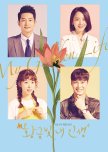
Weekend family drama, progressively challenging the concept of becoming/living as an ´adult´
“My Golden Life” is one of those KDramas that have been writing drama-history in South Korea. It is considered a 'national' series – popularity increased rapidly, the number of viewers doubled during the broadcast and towards the end, almost half of all nationwide TV audience during the weekends, while “My Golden Life” was broadcast, watched this series."My Golden Life" is a family drama, that doesn't just get lost in family clichés, Makjang and RomCom, but instead explicitly addresses some critical contemporary issues. Additionally, given attitudes and convictions are boldly deconstructed along the way. Thus, "My Golden Life" is a rather progressive family drama, involving also the 'quite new' concept of making personal life decisions despite (and in opposition to) family interests. In addition, more than one protagonist is questioning his/her life decisions or is forced to dealing with 'failure' (up to 'depression' as a result of learned helplessness), which is also quite progressive. Whether rich or poor, such issues likewise hit any income classes - in “My Golden Life”, too. In addition, there are current long-running topics such as the (lack of) work-life balance, discrimination because of social status, and the shame of divorce, as well as the increasingly sensitive issue of 'age'.
Ultimately “My Golden Life” is progressively challenging the concept of maturing in the sense of making my own, accountable decisions and thus becoming/living as an ´adult´. What does it mean, what does it need to be an 'adult'? ´Adult´ in the sense of having grown out of the familiar nest and being able to fly with my own wings? In the sense of being challenged to apply what I have learned in my own, individual manner? Is it allowed? Actually desired? Even wanted?
Notably gratifying and astonishing: Throughout the series, practically all of the divers family members go through their personal maturing processes against the background of various contemporary social issues. Many dramaturgical motifs may be familiar, but you can be sure that sooner or later everyone will be challenged with their attitudes and decisions being on trial. “My Golden Life” is not about stumbling through life with a social reptilian brain in obvious stimulus-response pattern. And it is not about by all means controlling the environment with the arrogant mindset of absolutist power fantasies. "My Golden Life" is intelligently and systematically deconstructing the usual set screws for critical life decisions (and dramaturgical plot developments.) In the end, almost every protagonist gets challenged and in the long run actually they all come to their individual, sometimes astonishingly mature, honest and even wise reassessments and re-decisions. This is (at least in this KDrama) possible, permitted, actually prerequisite.
Strikingly symbolic to deconstruction processes of social and individual assumptions throughout the story, ´gold´ is a metaphor for the estimation and valuation of an individual life. Its meaning and value is changing throughout the KDrama, parallel to the transformation processes of the protagonists... Most of the characters initially have the conviction that money (and associated with it: status) is the prerequisite or guarantee for happiness and a worthwhile, precious life... (as on the other hand the lack or loss of money is the reason or the cause of unhappiness and equivalent to a nugatory life.) However, most of them realize over the course of story that a ´golden´ life is not necessarily one that is successful, prosperous and meaningful because of a lot of money. In fact, an elitist, privileged life - being born with a ´golden spoon´ in the mouth - eventually comes with a ´golden cage´, too... Rather, a ´golden´ life is cordial, substantial and radiant with accountability and authenticity.
Within turbulent relationship dynamics (including a bit of Makjang-style topping when it comes to plot development) the 'impoverished middle class' and the 'dirty rich Jaebeol clan' are cleverly juxtaposed against each other, thus almost offensively confronting with the exaggeration of social class-affiliation and questioning traditional mindsets; additionally, full of wit contrasting submissive obedience and self-confident rebellion. Meanwhile, a dubious, arrogantly patronizing 'Noblesse oblige' virtue is craftily criticized, too.
“My Golden Life” is sometimes funny, sometimes intelligent, sometimes outrageously provocative, sometimes infuriating, sometimes emotionally serious, sometimes touching and sometimes downright grotesque. Being set as a family weekend drama, it is supposed to be easy to digest… yet, at the same time, the KDrama is consistently keeping its unabashed finger (gently, yet persistently) on the social scrapes, quirks and deep wounds, too. An astonishingly felicitous, ambitious balancing act. Overall, “My Golden Life” isn´t long-winded, even with 52 episodes. You may as well give it a try.
P.S.:
'Reassessment' seems to be the greater moral of the story.
Meaning: Traditional structures, rules, proven patterns and given orders may be all well and good. They may give orientation and set a direction in life. They provide a certain range of tools and know-how on how you can meet the challenges of life. But ultimately, in each individual case, it is still indispensable to carefully consider the appropriate application and decide for yourself what actually should be and could be accomplished. What is it, that I want? What is it, that I can do? What is it that I think is right? And what is it, that I am willing to supply?
At the end of education and apprenticeship usually there is a form of diploma or master's degree – not for mere copying, but for suitable, at best innovative application and enhancements. And in "My Golden Life" there are quite a few characters truly having earned their award... each in their own way. Eventually, it won´t do to simply adopt what others suggest, would have done or did before. It is all about individual solutions. Traditional lifestyles and attitudes are put to the test and are systematically deconstructed - voluntarily or involuntarily. In the end, the individually appropriate reassessment and authentically fitting solution does not necessarily have to lead to an easy or obvious decision...
"My Golden Life" is thus also giving a lesson in emancipation, too - in the original Latin and also in the more modern sense. Initially, Latin “emancipatio” was the “release of the son from paternal power”. In a broader sense: the child has grown or the student has been educated, so they can hold themselves accountable for their own life tasks and work obligations and thus take responsibility and reflect on their achievements accordingly. Additionally, in a modern, more general sense, emancipation is freedom from discrimination based on group, sex or class membership…
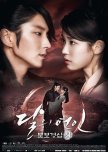
Entertaining, yet rather lightweight. Visually stunning scenes. Emotionally intense at times, too
Frankly, I'm not a fan of shallow, adolescent love stories. (Not necessarily because they are not good, but I guess I am too old by now. The topics are not mine anymore.) I'm interested in somewhat more complex, mature characters and differentiated relationship studies - preferably in an distinctive (Korean) context with additional historical, cultural or subcultural insight."Moon Lovers - Scarlet Heart Ryeo" originally goes back to a Chinese story. The movie adaptation was a great success and so here comes a Korean remake - the plot is unceremoniously moved to the Goryeo of the 12th century and a controversial historical ruler is portrayed on that occasion: the 4th son of the founder of the Wang dynasty (who ruled the Goryeo Empire for over 400 years) King Gwangjong, born under the name Wang So (925-975).
----------------------- SIDE NOTE --- King Gwangjong
Some historical sources have led to the interpretation that he was a right-wing tyrant, but more recent evidence suggests that he implemented the major reforms that laid the foundation for a solid kingdom for more than 4 centuries. This character has also appeared several times in KDrama, for example in "Taejo Wanggun" (2000), "The Dawn of the Empire" (2002), "Empress Chunchu" (2009), "Shine or Go Crazy" (2015) or here: "Moon Lovers - Scarlet Heart Ryeo" (2016).
Wang So had three older brothers (Wang Mu, Wang Tae, Wang Yo), 20 half brothers and 7 half sisters. From this, one can firstly see that he was not actually considered for the line of succession, and secondly suspect that King Taejo kept several wives at court. As life goes, all three older brothers died for different reasons and in the end the crown accidentally fell at Wang So's feet.
After a turbulent period of 3 kings in quick succession, King Gwangjong re-established a stable, centralized government with a strong, loyal army and 7 peaceful years before the aristocracy rebelled against his reforms (which came at their expense). One of his innovative reforms concerned slave ownership, which he had officially checked for legality. When in doubt, the slaves became free people and taxpayers (while their former masters began to lose influence...) However, putting down this rebellion of aristocracy earned him the reputation of a bloody tyrant.
Another reform was the introduction of a national civil service examination, which lasted for almost 950 years. This replaced the pure nepotism previously practiced in filling political offices with performance and ability. At the same time he laid the basis for Confucianism as a principle of social order. He also introduced a dress code at court, from which the respective rank could be read from the colors.
King Gwangjong married his half-sister and two nieces. This is unique in Goryeo's history, as it was more common at court to marry outside of the bloodline in order to gain allied lordships. Gwangjong, on the other hand, relied on a strong, purely royal bloodline. After all, he ruled for 26 years and set the course for the next 400 or so.
-----------------------------------------------------
Back to the KDrama. Unfortunately, the plot that was spun around this dazzling historical king and his family is a bit shallow and predictable at times. Sometimes it reminded me of a harmless, colorful teenage boarding school flirtation. (I obviously don't quite correspond to the target age group there...) But then, furthermore, the story offers unexpected depth and emotionally touching scenes, too. After all, it also comes along with some exciting and visually stunning sequences and an atmospheric soundtrack. I initially ended up there for ´actress´ IU in the first place. In fact, I discovered Lee Joon-gi (as Wang So) in this KDrama. In my eyes it is his down-to-earth charisma (and maturity?) that helps to overcome some weaknesses in the script.
An attractive dramaturgically dynamic component is the leap in time, through which the approximately 20-year-old Go Ha-jin (IU) suddenly ends up at the court of the royal Wang family - in the midst of the numerous sons and half-sons of King Teajo... As a woman from the future, she brings fresh air and a cheeky spirit into everyday palace life, which is characterized by distrust and intrigues. The various mothers are prepared to do almost anything in order to secure a royal career for their precious princes. At the same time, the modern Ha-jin in her idiosyncratic way brings the blue blood of the king's sons (some of whom are still quite pubescent) to a boil, thus providing additional competition among the boys on top of the already existing succession rivals ....
A nice, charming, entertaining, but rather lightweight KDrama-tour into Korean history.
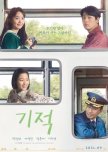
A lovingly told, soulful story based on true events. 117 uplifting minutes that´ll bring you joy
"Miracle: Letters to the President" comes across as a wonderful fairy tale. And yet it isn´t. The story arose from harsh reality. "Miracle" is a soulful KMovie about dreams come true, bathed in the bright colours of the four seasons in a remote, idyllic mountain valley. This landscape is a crucial player in its own, thus impressively contributing to the whole plot. Actually, a handkerchief or two might be helpful, even though the KMovie isn´t particularly playing on our heart strings. It's just a touching story, lovingly told.The setting of this true story: a remote mountain village in the east of the country, that can only be reached via the trass of the railway line. However, it does not have its own train station. For the residents, this means that they have to put up with an arduous walk along the trass in order to get to the next village as quickly as possible. For example, the protagonist spends five hours each day commuting to and from school. And quite a few people have already lost their lives on this dangerous walk over this busy trass through the mountains – including the mother of the protagonist. The boy's dream: a train station for his village. The chances are low, but he does not give up.
It may help that he actually seems to have a special talent for science. Also it may help that in Rah-hee, a bright daughter from an influential family, he finds a school friend and at the same time his muse, always encouraging and inspiring him in her idiosyncratic way. Thus, "Miracle" is also a tender, unusual love story with the charm of the 1980s.
So there are wounds and wonders, as well as wonderfully staged images, yet with a challenging core. All in all, a lovingly told, soulful story based on true events. Nostalgia of the 1980s, picturesque nature and rustic mountain idyll, the slower pace of provincial life and spectacular railway lines through tunnels and over bridges in the steep foothills of the Taebaek Mountains convey "Miracle" its distinctive character. The KMovie is bathed in an all-round positive aura. 117 uplifting minutes that´ll bring you joy.
-------------------------------------------------
SIDE NOTE: --- Yangwon Train Station ---
Socheon-myeon is a mountainous area in North Gyeongsan, in the east of the country.
The Korail Yeongdong Line crosses this area on its way from Yeongju in North Gyeongsang Province via Taebaek Mountain to Gangneung in Gangwon Province. Since 1988, the Yangwon railway station has been the smallest and also the first private railway station in South Korea. Until then, the village was isolated from the rest of the world in the middle of a rugged valley. Even though a railway line had passed the village since 1955, the train had never stopped. There was also no road leading to the village. 3.7 km of railway line separated the villagers from the nearest Seungbu railway station and thus connections to other towns and cities. With ax, shovel, mortar and sweat, the villagers finally built their tiny train station themselves.
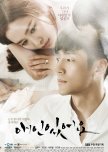
Touching, moving, stirring, rousing, exciting: Makjang, yes. And Rom+/-Com. And more. Fabulous.
Truths just want to come out. Thus, sometimes they find quite miraculous ways."I Have a Lover" features Makjang. However, the KDrama also and above all offers an unusual love story over 50 episodes.
It also tells about the creeping drama of marriage after the 'point of no return', when secrets and/or feelings of guilt, disappointment and reproaches have long barricaded the couple's way to each other and marriage has become a stale shell or facade, with hardly any space for dear affection left. Eventually, with all those hidden emotions it becomes increasingly difficult to lovingly respond to each other. At last, it may seem impossible to pave a new way towards renewed trust, closeness and genuine intimacy.
Moreover, "I Have a Lover" tells about the trauma that couples as parents suffer from the loss of their child. This KDrama is about painful emotions not being shared, getting in the way of a trusting, loving, intimate relationship. In the most desperate moments the one you need the most seems the furthest away. Missing a comforting connection makes it even worse. Finally, the insincerity leads towards sadness, anger or even indifference and detachment regarding the hollow relationship.
Drawing human characters with their shadows and radiance, the KDrama tells of the whole range of emotions people have and share in intimate relationships. "I Have a Lover" portrays an extraordinary character development process. Will the couple thus be able to reconnect?
The side plots add to the sophisticatedly composed symphony of complex, conflicting emotional worlds. It's about pain and hope, disappointment and forgiveness, sincere love and betrayal, above all about romantic love, but beyond that about love in all possible facets. Family in its ambivalence as bonding and bondage, as an ambiguous place of trust and obligation, forms a creeping leitmotif that holds all the narrative strings together.
The scenarios effortlessly switch between different living environments. The focus is also on lawyers - those 'footmen' serving the elite big corporations and those 'upright' serving the little folks.
At first, I wasn't sure if I wanted to follow an exhausting relationship between estranged spouses for 50 episodes. But it quickly became apparent that the story and its two perfectly harmonizing leads invite you to depart on a wonderfully refined emotional trek through the human emotional worlds.
"I Have a Lover" is touching, moving, stirring, rousing, exciting. It is Makjang, yes. It is Rom+/-Com, and more. Fabulous.
Ps:
The KDrama (despite the 50 episodes) suits for a rewatch, as many aspects and details might then become even more meaningful...

When is a woman beautiful? When is she not (anymore)? What does it mean for love? For work?
"She was Pretty" is a true story, so they say. It's about love - of course. The first love, too. And about being a woman in South Korea. When is a woman beautiful? And when is she not (anymore)? And what does that mean for her then? For love? For work? For social life? For your self-esteem?That's what this KDrama is about.
Wanting to be beautiful as a woman is widespread. Needing to be beautiful as a woman is deeply Korean. In hardly any other country do women spend so much time on skin care and make-up. Impeccability of the personality is reflected (in the South Korean self-image) in the form of pure skin and so facial care is part of a comprehensive ideal of beauty. The KBeauty industry supplies innovative products for this. In Germany, there are an average of three to five care steps that women use for their facial care. South Korea has become known for its "10-step Korean Skincare Routine", which (should) lead to a flawless porcelain complexion in lengthy and loving detail work.
In my experience, series that deal supposedly critically with ideals of beauty, bullying based on appearance, discrimination based on aesthetic value judgments and norms tend to have a hard time. They can't really be critical since their sponsors often come from the KBeauty industry... And they can rarely present an "ugly", "repulsive" character as a protagonist if they want the viewer to identify with it and actually watch the series. The subject calls for compromises before the story can even be thought through, let alone be told. Most of the time, this results in a transformation process for the protagonist: she transforms into a beauty that men and women can no longer overlook, and as a result she at last gains (now well deserved) self-esteem.
That's why I'm not a fan of this type of series. Even if the actresses are usually very committed, perhaps because the topic is so important to them. But the story can't help it... In the end, the solution is the transformation - the ugly duckling blossoms into a pretty woman and thus causes plenty of "Aha!". That doesn't convince me personally, because the core of the problem is rarely shaken, at most it is touched on the shell.
Accordingly, "She was Pretty" is not among my favorite series. Still I like it. Why? After all, there is the male character of Shin-hyuk. He's a great guy, he's good-looking, he's got what it takes - but he doesn't act like the norm. He takes a close look behind the facades and encounters the human in the woman, not the image of the woman. And falls in love with the woman as she is (before some kind of transformation). I think we need more role models like this. In "She was Pretty" at least there is one. It's encouraging and also fun to watch Shin-huyk (refreshingly played by Choi Si-won) in his encounters with the 'Ugly Duckling'.
Of course, ugly is relative in this KDrama as always. The protagonist, Kim Hye-jin, was once one of the prettiest girls in her class and totally hip. However, she has inherited her father's skin, which is characterized by a noticeable redness in the cheek area. Also, her hair is naturally frizzy. Although this might disturb the eye of the South Korean viewers, it is actually nothing that cannot be remedied with a few interventions, if a woman wanted to. Hye-jin just doesn't want to. To her it's not worth it (also in monetary terms). Yet that's how she offends people and makes social life and professional life difficult.
She compensates for her flaws (and thus her lack of value as a woman) through hard work. At the same time, she and her goodwill constantly invite others to have her be exploited. There's a memorable scene in which she takes on the new job with a competitor. Her co-worker is what you might call pretty (at least she's done a lot to be). As a reward, she is given permission to manicure her nails during working hours and to work rather slowly (if at all). Hye-jin, on the other hand, is passed around, pushed and insulted. The ideal of beauty for women - beyond performance - thus influences hierarchies in the working world. Unfortunately for South Korea this is a widespread status quo.
With Hwang Jung-eum and Choi Si-won being in a cheerful mood and providing plenty of fun in the midst of the actually less funny social conditions, the KDrama becomes worth seeing. The exalted editor-in-chief of the lifestyle magazine, who changes her hair color and her outfit with the hour and constantly recites from Italian operas, also ensures a good mood.
Ah, yes, this Kdrama is first of all a rom(ance) with some com(edy) in search of a happy ending. Some things may be predictable, but some are not.
As far as the beauty-topic ist concerned: It´s never too far from the norm, but some socially critical echoes could still be sprinkled nonchalantly throughout the course of the story. ...Humor paves the way for serious messages...
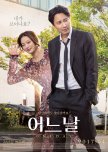
A pleasantly beneficial KMovie infusion. Quiet. Tender. Full of consolation & healing impulse
"One Day" is a beautiful KMovie. Quiet. Tender. Full of consolation and healing impulse. In addition, the story expands the usual dimensions of perception - human being sees ghost; man builds relationship with ghost. The extraordinary situation facilitates extraordinary closeness, opens up new perspectives and allows the male protagonist to look behind the obvious.The female lead character is visually impaired in life, yet specialized in sensing touch instead. The male protagonist, on the other hand, finds himself in a stage of his life, where he prefers to avoid his feelings, because they might overwhelm him. His inability to face the grief over his deceased wife, his feelings of guilt and being lost completely block him. By the way, the female protagonist is also blocked: she is in a coma.
The process of rapprochement between the two triggers a healing process, which is captured tenderly and lovingly, reaching out to the side plots, too. The KMovie knows how to touch. It might come along in an unexcited manner, yet with the perseverance of water, dealing with the stone...
After seeing the movie for the first time, I had no idea what had happened to me. It had pulled me into gentle inebriety. I had actually been sucked in and completely lost the distance.
So I couldn't write anything about it at first. I knew, l would rather want to see it again sometime in the near future. And again, it might not have been my last encounter with “One Day”. Why? Because of the overall gentle tone, the particular radiance, and the unique look&feel of this story. Because it's good.
“One Day” is not a blockbuster, no. However, in my eyes and according to my feeling, it offers a pleasantly beneficial KMovie infusion. (With wonderful acting, too.)
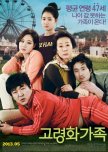
Dysfunctional family to touch. True to life. Rough. Surprisingly on a positive note though
"Boomerang Family" refers to the term 'boomerang kids': adults who for pragmatic reasons move back in with their parents - mostly for financial reasons, because of unemployment or because of divorce. The protagonists of this KMovie are the mother, her three adult children and her granddaughter. Together they form the boomerang family.In South Korea, family is the greatest good. Family is omnipresent and gets involved everywhere. This does not mean, however, that family is therefore only associated with happiness, love and warmth. On the contrary. There's a lot of pain associated with it. Much is and remains unsaid. Punches are often included as well.
That's what "Boomerang Family" is about - the dysfunctional aspects of a simple family. Strife and rivalry and fights. Envy and inferiority. Pride. Yet also moments of happiness. Eventually not being seen. Yet, being seen, too. Unspoken truths that will sooner or later be told anyway. Very private, often rough, unsightly, even downright repulsive manners in everyday interactions in the smallest of spaces, which we actually (if at all) only share in the closest, most intimate circle. E.g. in family, that takes you as you are. (Inevitably.) (Out of habit.) (Because one is just so familiar due to the proximity in time and space that one has shared.) (Out of love?)
The bottom line in "Boomerang Family" is love, which, in its most screwed up way, slumbers and lurks somewhere behind the curtain of mostly ugly, all too familiar patterns of everyday, long-established, well-established manners. Strangely enough, it is simply there.
In the world of the protagonists that curtain is rather shabby. Life is simple. The language rough. Proximity is created through shouting, scrambles and fights. Community can be experienced through shared meals, though. Those meals structure family life and become a connecting, binding medium. The common meal is the place of communication and encounter under largely regulated, peaceful conditions. Everything before and after, however, can quickly (almost certainly) get out of hand.
A special aspect for South Korean conditions, where the direct bloodline is still enormously important: Over time, it becomes clear that the protagonist family is actually a rather progressive variant of a patchwork family. Because of that fact, at first glance all seems to be in question. Nevertheless, this realization cannot erase the lived experience as a "family". The simple, unnamed, tangible, rustic, crude 'love' between siblings that is celebrated with this movie, is not in the genes, but has grown out of shared experiences. In this message lies the magic of this otherwise rather brittle, sometimes dark story. Eventually the heaviness is balanced here and there with a breeze of quite idiosyncratic humor.
Everyone in the family has their own stories and small, medium or big tragedies that bring them back together under one roof. A dysfunctional family to touch, true to life, authentic, in all obscenity. As a spectator, you are brought up close, sometimes closer than you might like. Heaviness and pessimism may want to impose themselves in the course of events, but they ultimately fail to determine the emotional space. You wouldn´t believe it, but the story ends on a consistently positive note.
The KMovie is a film adaptation of a novel. It could also be a theatrical performance. It touches, repels, shamelessly places the ugly next to moments of happiness. Who actually is to judge life? What is good? What is beautiful? What is valuable? What is happiness? Ultimately, all protagonists feel (not only, but ALSO) valuable and happy in their affiliation. So what are the criteria for evaluating the quality of life? "Boomerang Familie" chooses a very idiosyncratic, but ultimately soothing perspective - beyond lifestyle, image, aesthetics or monetary wealth.
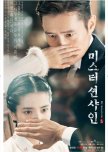
This KDrama is more like an epic movie that (fortunately) doesn't want to end over 24 episodes
"Mr. Sunshine" is pure epic! Visually stunning! Heartbreaking. With a fantastic cast! In addition, there is a vivid and at the same time gripping history lesson (dealing with the turn of the 19th / 20th centuriy). The KDrama is more like an epic movie that (fortunately) doesn't want to end over 24 episodes. Complex characters, interwoven developments with sudden twists, cinematic camera, unforgettable soundtrack, everything seems handpicked, nothing off the shelf. The budget was correspondingly high, but it isn't just good because it was expensive. Rather, it is made with a lot of love from front to back and down to the last detail. There are hardly familiar motifs that we have often seen in variation. Everything is precisely coordinated in all scale levels. The personal decisions that the protagonists make over and over again in the course of the story remain unpredictable until the end.Historically we learn about the relationship between Joseon and the Japanese, but also with the rest of the world. The story takes place before the country becomes a Japanese protectorate - in that brief window of time when Joseon (after a long period of isolation) became the Greater Korean Empire and then opened up to the rest of the world. For this reason, the USA also play a role in here, because the States - like Russia and Japan - are ready and waiting to get involved in the imperialist competition for the largest slices of the cake Joseon is offering. The country is rich in raw materials and therefore hot property. "Mr Sunshine" provides a vivid and gripping introduction to those geopolitical complications.
------------------ SIDE NOTE --- Historic setting: Joseon and the rest of the world ...
Since the 17th century, Joseon rather had itself isolated from the outside world. This rigorous attitude ultimately led to the first military confrontation between Joseon and the USA, which marks the kick off point to the plot of "Mr. Sunshine". In 1866, an American ship, the SS Sherman, entered Korean waters via the Taedong River. Since it did not turn around immediately when asked, there were violent arguments in which the ship was ultimately set on fire. This was followed in 1871 by the battle off the island of Ganghwa-do, in which the USA wanted to rescue the survivors of the shipwrecked crew and at the same time establish the first prerequisites for trade relations. However, since the desired diplomatic gesture of the Korean apology did not happen to take place, the Joseon garrison on the island was radically wiped out by the American warships and their crew. This first conflict with the USA went down in history as 'Shinmiyangyo'.
King Gojong came to the throne in 1873 and, in contrary to previous national policy, decided to open up his country in the hope of flourishing trade and technical innovation. Japan pushed ahead and forced the Japanese-Korean friendship treaty of 1876 on the king, including military pressure, too. However, this was a contract between unequal friends... In the course of the international processes that had been initiated, King Gojong also sought contact and trade agreements with Western countries.
---------------------------------------------
During this time, "Mr. Sunshine" stages its main plot, in which protagonist Eugene, as US officer of loathed Korean descent, is supposed to sensitively, competently and diplomatically represent the interests of the USA with a consular mandate. But there is always more life has to offer... Eugene has to meet the love of his life, face his roots and reconsider his values in life. He can´t help it: he has to take a stand...
It is said that not everything is historically 100 percent precise, but the historical circumstances provide plenty of material for pure epic drama at its finest. Thrilling. Unforgettable.
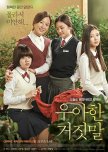
Fantastic, the (red) thread - in every respect.
I have been reading only positive critiques about “Thread of Lies” all over the place. It just took a while before I could see the KMovie for myself. Basically, all the praise has already been said. Nonetheless! The story, which is sad in itself, is told, staged and acted in just such a wonderfully clever way! Despite the seriousness of its topic, the basic attitude is positive and light. The complex and complicated underlying social and emotional mechanisms are so sensitively identified and processed, I can't help but find words of praise for "Thread of Lies" myself, too! Absolutely worth seeing! The characters, their motives and backgrounds, their conflicting feelings, the gray in the shadow, the light in the darkness, everything comes across as multidimensional authenticity.The older sister sets out to find out the actual reasons for the suicide of her younger, 14-year-old sister. We with her. There are traces – Suspicion. Culprit. Fault. Shame. As far as the eye can see... ...including the look in the mirror. Yet, it is not the index finger being raised. Rather, there is a hand, valiantly reaching out. Powerful!
It is not about accusation and blame or justification and defense. It is like it is. It was what it was. Recognizing THAT for what it is. Not sugarcoating it. No excuses. Recognizing each individual’s own contribution to some tragedy. It's all about this. To learn something out of it? In the best case!
In this KDrama, bullying (or mobbing) comes without bloody beatings and physical violence. Rather, it is the psychological, manipulative, nastily hidden, difficult-to-understand social-emotional mechanisms that are elaborated in an extremely sensitive, comprehensible way. A girl is forced into inner isolation at an age when the peer group actually becomes more important than family. Friendship, dependence, abuse - the boundaries are not yet so clear. When it comes to that, the young are still 'children' – perhaps with high ideals already, but still without lived friendship-experience. Friendship is a word with deep meaning, a powerful concept. It is related to high hopes and yearnings. It is needed, in order to survive in this world.
In contrast, there are parents who know better and still duck away. There are bullying victims who somehow survived. Also parents, who are absorbed in their own world. And in the middle of it all, a young girl says goodbye to this world. Decided and definite. Yet at the same time hesitant, too. Desperate after all. Helpless. A 14-year-old says goodbye to a world in which the only one, who knew about how she truly felt, was a stranger...
The complex story is processed in a non-linear manner. Compact and yet differentiated. The tragedy of the unspectacular is intensified by a rather subtly developed arc suspension. Touching, but not told in an overly emotional way. And what can I say... the story unfolds in such a true to life manner that you can't even be angry with the venomous perpetrator. At least not as much as you would like...
Fantastic, the (red) thread - in every respect.
PS:
The story is based on the novel “Elegant Lies” by Kim Ryeo-ryeong in 2009. Actually, the film production had a rather low budget and its initial difficulties to get started, as the topic is considered highly sensitive, especially in South Korea. The KMovie, however, gave the lie to the doubters. The response was enormous and consistently positive.
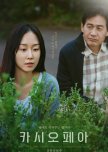
Father + daughter challenged in the face of presenile Alzheimer
Cassiopeia has already won the Korean Association of Film Critics Awards 2022.I would recommend it, too.
The KMovie Cassiopeia tackles an unpleasent subject: presenile Alzheimer's dementia. In an increasingly aging society, dementia will become more and more present and more common within the personal environment of all of us. Most cases occur at ages 65+. However, a small percentage is also affected at a younger age. This can even occur very early due to hereditary factors - as documented sensitively and unforgettable in the KMovie "A Moment to Remember". But this can also have many other causes. Dementia is a shocking diagnosis at any age, because with your eyes wide open, your own life inevitably slips away... faster than you imagine, you will no longer be able to recognize your own children, partners, friends or parents, while also the bodily functions will do their own thing.
"Cassiopeia" is about a woman in her 40s who is overwhelmed by presenile Alzheimer's dementia. However, the narration is slightly different than in "A Moment to Remember". "A Moment to Remember" captures the strong emotionality of the mental degeneration process practically from within - in touching scenes and sensitive relationship dynamics and tells the story of how memories in her head are erased as a painful loss for everyone involved. In "Cassiopeia", on the other hand, the audience follows the accumulating social moments in a comparatively objective manner, in which the exponentially progressing decay of the nerve cells is expressed - simply stating, so to speak. (Just as the protagonist initially presents herself as an objective, sober and rather sever person.) Emotionality is not dramaturgically staged in this KMovie, but results from the sum of soberly observed situations of individual loss of control and Su-jin's familiar world broken in two - one in which clarity still reigns and one in which everyone, even she herself is a stranger. From the emotionality thus involved - fear of failure, helplessness, shame, being at the mercy of others and much more - one cannot withdraw oneself. Rather, this emotionality develops an increasingly peculiar driving force (just as the protagonist's psychological/physical development process picks up speed). Eventually, the KMovie goes straight to the heart and makes people think.
In "A Moment to Remember" the focus was on the relationship dynamics with the beloved husband, here it is the portrait between daughter and father. In this case, the father tries to do better in old age what he could not do when he was younger, as he was not around.
In "A Moment to Remember" the protagonist is still at the very beginning of her young, promising life. In "Cassiopeia" Su-jin has achieved quite a lot: she is a mother, a successful lawyer, and also divorced. The daughter is about to move to her father in the USA. Significantly, the life of the protagonist, as it was up to now, ends in several respects with the departure of her daughter. It becomes difficult even for the star constellation Cassiopeia to give life perspective and orientation...
(By the way: the KMovie builds on a nice analogy between Cassiopeia and family. Both the star constellation pointing to the North Star and one's own family cannot help you, finding your path and your own way with life. Yet, we can rely on them if we got lost along the way: as some place to look out for/reach out for, regarding perspective/support).
Emotive. Especially by those often deliberatly soberly, calmly captured situations in which both the orderly and deformed worlds meet and finally merge. The helplessness and coldness of the social environment enfolds in all its unvarnished harshness - by its objective narrative style and camera perspective it is subtly thrown back at us. We are emotionally drawn into what is happening in two respects: regarding our empathy with Su-jin, which we cannot escape in the progress of the story, as well as regarding our identification with people/strangers Su-jin meets along the way - because that is what we are, too. How do WE actually deal with people who have obviously lost control of their lives or are about to lose it? Can WE stand this? Can WE lend a helping hand with this? Be of support? Even (or especially) if it's just a casual encounter on the street, an acquaintance in the neighborhood, or a colleague at work?


 9
9 38
38 15
15

















